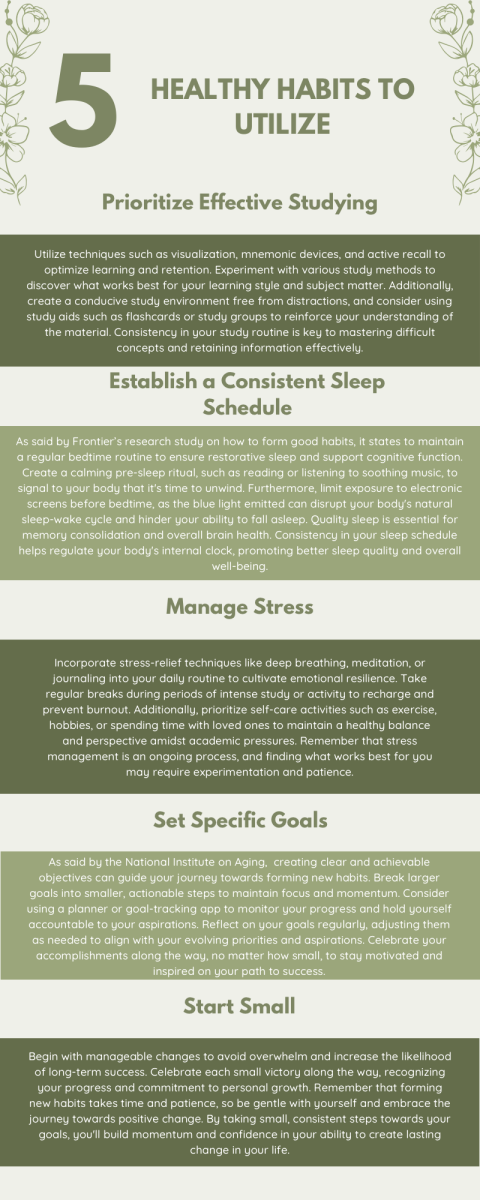In high school, developing healthy habits is essential. From getting enough sleep to managing stress effectively, these habits are vital for doing well academically and staying healthy. They are not just options but the best path to reaching full potential.
As hectic days of classes and activities continue, finding solace in the realm of sleep becomes essential. Establishing a good sleep routine is paramount for high school students aiming for academic excellence and overall well-being. Here are some effective strategies to aid in building a solid sleep routine:
Utilize Melatonin or Magnesium: Incorporating melatonin supplements and using magnesium spray on your bed can promote better sleep quality. Scientifically, higher magnesium levels in the body are linked to improved sleep, leading to enhanced concentration and cognitive function during the day. However, always talk to your healthcare provider before taking any new supplements.
Set a Bedtime: Aim to fall asleep by 9:00 pm, but no later than 10:00 pm. Consistency is key to regulating your body’s internal clock and ensuring adequate rest, which supports memory consolidation and learning.
Designate Your Bed for Sleep: As sourced from the American Academy of Sleep Medicine, they state to avoid turning your bed into a workspace. Instead, be productive on the couch or at a desk or in another area of your home. Your brain associates your bed with sleep. Keeping it free from work-related activities enhances sleep quality, fostering a restful and rejuvenating night’s sleep.
Create a Peaceful Environment: Remove electronic devices from your bedroom and ensure your sleeping space is dark and tranquil. Minimizing distractions promotes relaxation and prepares your mind and body for rest, facilitating deeper and more restorative sleep.
Embracing a routine, both in the morning and at night, can significantly enhance productivity and well-being for high school students. A structured morning routine sets the tone for the day ahead, providing a sense of purpose and direction. Whether it’s waking up at a consistent time, engaging in mindfulness practices, or enjoying a nutritious breakfast, each element contributes to a positive start:
Morning Routine: Start your day with intention by incorporating activities such as stretching, hydrating, and setting goals for the day ahead. A nutritious breakfast fuels your body and mind. This provides sustained energy for the day’s activities and enhances focus and cognitive function.
Night Routine: Wind down in the evening with calming activities such as reading, journaling, or practicing mindful meditation. Limit screen time before bed to promote relaxation, reduce blue light, and prepare your body for rest, resulting in improved sleep quality and overall well-being.
Managing stress and maintaining emotional well-being are essential for student success and overall happiness. Backed up by science, these are some effective strategies to navigate the challenges and pressures of adolescence.
Don’t Bottle Up Stress: Talk it out with friends or family, or seek support from a counselor or mentor. Expressing your feelings and concerns can help alleviate stress and provide clarity, encouraging emotional resilience and mental well-being.
Journaling: Keeping a journal allows you to process your thoughts and emotions in a private and reflective space. Writing down your experiences and feelings can promote self-awareness and emotional well-being, facilitating stress management and promoting psychological resilience.
Meditation: Incorporating mindful meditation into your daily routine can reduce stress, improve focus, and promote overall mental well-being. Taking a few minutes each day to practice mindfulness can have profound effects on your mental and emotional health, enhancing resilience and promoting a positive outlook.
Stress Management: Practice deep breathing exercises, progressive muscle relaxation, or engage in activities that bring you joy and relaxation. Finding healthy outlets for stress can help you cope with academic pressures and maintain balance in your life, promoting emotional well-being and overall resilience.
Avoid Procrastination: Study as you go rather than waiting until the last minute. Create your own study guides and tailor your learning approach to your individual learning style—whether visual, auditory, or kinesthetic/tactile. Consistent study habits enhance academic performance and reduce stress associated with deadlines and last-minute cramming.
Effective Studying Techniques: Utilize mnemonic devices, such as visualization, storytelling, acronyms, and acrostics, to make learning more engaging and memorable. The Von Restorff Effect and humor can also help information stick, improving retention and recall during exams and reducing test anxiety. *source
Psychologically, navigating change within the brain poses considerable challenges. Numerous research studies, such as Frontier’s research study by Jeroen Benjamins, Marleen Gillebaart, Denise de Ridder, Anouk van der Weiden, and Jan Fekke Ybema, have delved into the intricate correlation between self-control and the establishment of healthy habits. Recent findings have shed light on innovative approaches to solidify these habits and make them a lasting part of one’s lifestyle.
Plan Your Goals: Use tools like Pinterest idea boards or Post-it notes to plan and track your goals. Having a clear roadmap fosters motivation and helps you stay on track, enhancing productivity and goal attainment.
Have a Positive Mindset: Change your mindset positively by focusing on your progress and celebrating your achievements, no matter how small. Be kind to yourself and acknowledge your efforts to gain self-confidence and resilience in the face of challenges.
Making good habits requires consistency and commitment. As stated from the National Institute on Aging, some behaviors to keep habits consistent are as follows:
Start Small: Begin by incorporating one or two new habits into your routine at a time. Trying to change too much at once can be overwhelming and unsustainable, increasing the likelihood of burnout and relapse.
Be Consistent: Stick to your new habits even when motivation wanes. Consistency is key to forming lasting behaviors, leading to long-term success and well-being.
Find Accountability: Share your goals and progress with a friend, family member, or mentor who can provide encouragement and support. Accountability increases motivation and reinforces commitment to your goals, enhancing the likelihood of success.
Celebrate Progress: Acknowledge your achievements along the way, whether it is completing a week of consistent exercise or improving your sleep quality. Celebrating milestones keeps you motivated and reinforces your commitment to your goals, boosting self-esteem and confidence.
Reflect and Adjust: Regularly evaluate your habits and routines to identify what is working well and where you can make improvements. Flexibility and adaptability are essential for long-term success, allowing you to refine your habits and strategies as needed to support your goals and well-being.
By incorporating these strategies into our daily lives, students can develop healthy coping mechanisms and build resilience in the face of adversity. As they navigate the ups and downs of high school, it is essential to prioritize self-care and emotional well-being to thrive academically and personally.







![WORK TO SUCCEED By working these tips into their study schedule, students can reap the benefits of AP courses. With just a few easy lifestyle changes, and new methods before the test, students can see an increase in scores that other successful students have witnessed. “It‘s really about making sure that throughout the year you know what you're doing,” senior Angela Karanja said. “[Also] being calm the day of, so that you can remember everything that you learned [is helpful].” Infographic by Ava Gomez.](https://thescarletscroll.com/wp-content/uploads/2025/03/IMG_5210-1200x676.jpeg)
![A YEAR IN REVIEW
Between Nov. and Dec. 2024, 57 respondents voted for their favorite songs, artists, and albums. Every category had multiple options, and each one faced tight competition as the artists Sabrina Carpenter, Kendrick Lamar, and Billie Eilish battled for the top spots. Students like senior Payton Bauer encourages others to check out other popular singers, if they haven’t already. “I would say [listen to Carpenter] if you're [wanting to] feel good about yourself,” Bauer said. “Or maybe you just want something to work out or dance to. [Her music is] really fun.”](https://thescarletscroll.com/wp-content/uploads/2025/02/Orange-Black-Why-Vinyl-Records-Rock-Music-Infographic-e1738774839991.png)


David Pizarro • May 30, 2024 at 6:56 pm
I really liked the article. It was easy to understand and had great insights. I’d definitely recommend it to others.